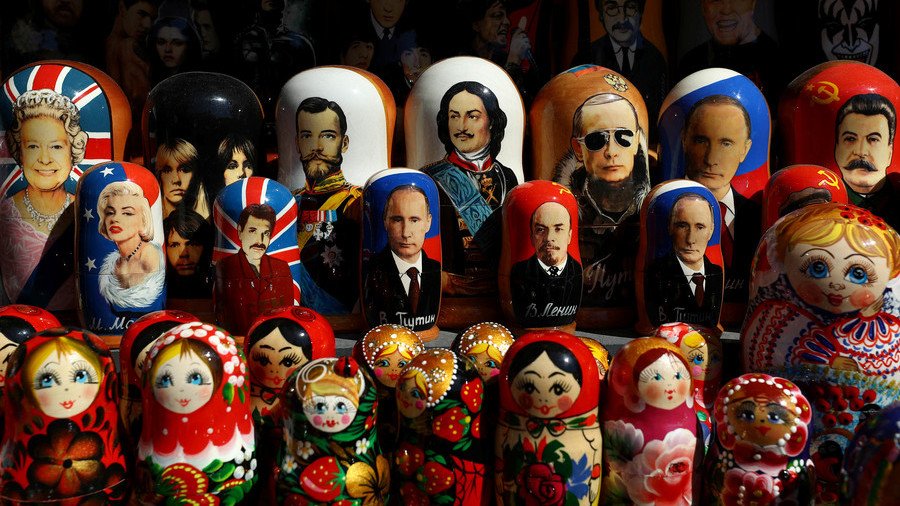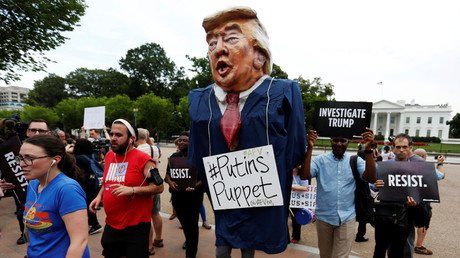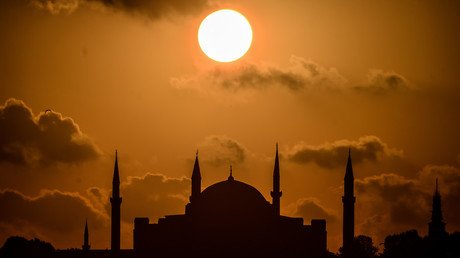America's deep-seated Russophobia is bringing US-Russia relations to the brink of ultimate disaster

Starting around WWI, the US has experienced at least three waves of anti-Russia sentiment. What is unique about today's Russophobia is that it's not based on ideological differences, but rather raw political brinkmanship.
When viewing particular chapters of American history, it becomes evident that US leaders have a tendency to believe, or feign to believe, that Americans are totally incapable of acting and thinking for themselves. We the ignorant sheeple are simply unqualified to act as independent agents in times of crisis. Instead, the American people are being manipulated like marionettes at the hands of some foreign puppet master, which, as we have been reminded of late on numerous occasions, is Russia.
Russophobia in the US has deep roots. In 1919, coming just after WWI and the Russian Revolution, an imagined Bolshevik bogeyman was seen as the force behind a series of domestic upheavals, like the Seattle General Strike when 65,000 workers walked off their jobs for five days, and the Boston Police Strike, which saw officers protesting for better wages and conditions.
The rationale to explain those past social seizures sounds strikingly familiar today: any American who dares speak out on some domestic issue must be under the subtle influence of a Kremlin indoctrination campaign.
The mythical beast from the east raised its head again in the 1950s as Senator Joseph McCarthy launched a political witch hunt against suspected communist sympathizers in various fields, including government, education and labor. In a sign of repressive times to come, Americans were subjected to show trials conducted by the 'House Un-American Activities Committee (HUAC),' a public spectacle that systematically ruined the lives of hundreds of citizens under specious claims.
In Hollywood alone, an estimated 300 industry names, including Charlie Chaplin and Orson Welles, were placed on blacklists. Chaplin, eventually ostracized from Hollywood, was forced to flee the country for Switzerland; Welles, under similar duress, also fled to Europe, becoming a "wandering European filmmaker."
An article in the Harvard Crimson summed up the 'reign of terror' then gripping the nation: "In the fifties, the most effective sanction was terror. Almost any publicity from HUAC meant the 'blacklist'. Without a chance to clear his name, a witness would… suddenly find himself without friends and without a job."
Today, 'McCarthyism' is a synonym for leveling accusations of subversive activities or even treason without providing any sort of evidence. Yet it seems Americans have discarded that part of their history, much to the dismay of US-Russia relations.
This leads us to a bit of modern insanity known as Russiagate, a political show trial whose leading instigators make Joseph McCarthy look like a levelheaded statesman by comparison. After all, there were some grounds for suspicion on both sides of the US-Soviet ideological divide that makes McCarthyism somewhat understandable. Indeed, it must have certainly discomfited the Washington elite that some Americans were becoming increasingly attracted to communism as the ugly side of capitalism – magnified by the earlier deprivations of the Great Depression - was being revealed.
Compared to previous American 'Red Scares,' Russiagate lacks any ideological mat where one may lay the blame for the bilateral breakdown. Instead, it is a dangerous game of political brinkmanship between the two main - I would argue only - US political parties in a desperate bid for seizing the ultimate reins of power. In fact, Russia is an innocent bystander caught in a domestic crackup. This is proven by the fact that the accusers have failed to produce any physical evidence to substantiate the claim that Russia meddled in the 2016 presidential election.
One way for the grand inquisitors to quickly wrap up their Russiagate probe is to have WikiLeaks founder Julian Assange - who has previously declared his desire to "clear this whole Russian thing up" – safely provide testimony before US lawmakers. And 'safely' is the key word here. Although the US Senate Intelligence Committee has sent a formal request for Assange to appear before them in person, the likelihood of such a public spectacle – which would certainly be the media event of the year – seems highly unlikely. After all, one of the main reasons the WikiLeaks editor is holed up in the Ecuadorian embassy in London is that he believes the British authorities will extradite him to the US, where yet another group of US lawmakers have vowed to prosecute him for publishing hundreds of thousands of classified US military and diplomatic documents. Meanwhile, testifying via video conference also seems unrealistic since the Ecuadorian government of President Lenín Moreno has terminated Assange's internet access. So much for getting to the bottom of Russiagate.
BREAKING: US Senate Intelligence Committee calls editor @JulianAssange to testify. Letter delivered via US embassy in London. WikiLeaks' legal team say they are "considering the offer but testimony must conform to a high ethical standard". Also: https://t.co/pPf0GTjTlppic.twitter.com/TrDKkCKVBx
— WikiLeaks (@wikileaks) August 8, 2018
What this means is that the US political system, not 'Russian hackers,' is the ultimate source of our current malaise. Since there is no real third party to challenge the status quo, Donald Trump himself represented this crucial missing link of the US political system. And since he promised on the campaign trail to do some very radical things, such as scale back America's global military footprint and end hostilities with Russia, two of the biggest money-making rackets on the planet, the Establishment was forced to act.
After all, there is simply too much money and power at stake in the US political system - the "best democracy money can buy," as the journalist Greg Palast described it - to allow a renegade real estate developer and TV personality to just walk in and destroy it overnight. Thus, once it became apparent that Trump would most likely win the 2016 election (it is my personal opinion that the likelihood of a Trump victory was known well in advance, despite, or precisely because of, what the mainstream media polls predicted in one uniform voice), the elite rolled out 'Red Scare III' in a desperate bid to bury the Republican powerhouse and keep control of the US political machinery.
So, what we have here is the US political system, suffering the malignancy of its own internal contradictions, essentially feeding off its own tail in order to survive just the short term. The remedies that the maverick Donald Trump - a 'third-party candidate' who was clever enough to outmaneuver the most ruthless political gamesters in the business - was willing to impose in order to return some normalcy to US foreign policy were rejected, much to the detriment of global peace and security.
READ MORE: Latest sanctions against Russia show Trump not in control of his administration
The problem with the US 'Deep State' exerting pressure on the White House over Russia is obvious: it has forced Donald Trump, who is certainly mindful of approaching Midterm elections, to go to dangerous extremes to demonstrate that he is "tough on Russia." Just this week he announced new sanctions against Russia over the British 'Skripal affair,' which involved the miraculous recovery and subsequent disappearance of former double agent Sergei Skripal and his daughter after allegedly being exposed to the Novichok nerve agent, yet another groundless smear job against Russia.
Although Russia certainly understands that it is being used as a convenient scapegoat in a bitter battle between two entrenched US political parties that threatens United States' very survival, it will have no choice but to respond in some manner to such aggressive actions.
To say that is an unfortunate turn of events, when Trump had initially promised a new day in US-Russia relations on the campaign trail, would be the understatement of the century.
Think your friends would be interested? Share this story!
The statements, views and opinions expressed in this column are solely those of the author and do not necessarily represent those of RT.

















